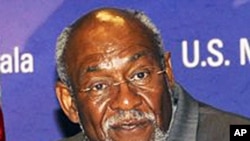The United States is renewing its call for Ivory Coast President Laurent Gbagbo to yield power to the internationally recognized winner of the country's November election. Assistant Secretary of State for African Affairs Johnnie Carson says Mr. Gbagbo's continued hold on power amounts to election theft.
The Obama administration is trying to turn up the political pressure on Mr. Gbagbo to step aside, with the State Department's chief Africa diplomat warning again that chances for a face-saving end to the crisis for the long-time Ivory Coast leader are dwindling.
In a talk with reporters, Assistant Secretary of State for African Affairs Johnnie Carson said U.S. officials believe very strongly that Mr. Gbagbo should "turn over the reins of government" to what he termed the "properly elected" president, Alassane Ouattara.
The Ivory Coast independent electoral commission, backed by the United Nations, said Mr. Ouattara won the country's November 28 presidential run-off.
But the country's Constitutional Council, run by an ally of Mr. Gbagbo, later ruled that he had won, citing voting irregularities in the country's northern region, a Ouattara stronghold.
The State Department has confirmed that the United States is among several countries that have offered to consider refuge to Mr. Gbagbo if he steps aside. Carson said chances for a graceful exit for Gbabgo remain, but that they are dwindling.
"He still has an opportunity to accept a number of offers that have been put on the table," said Johnnie Carson. "But the longer this crisis goes on, the chances for those opportunities to remain diminish. This is a challenge to democracy not only in the Ivory Coast, in West Africa, but to the democratic community. There is no question that the election in the Ivory Coast was stolen by President Gbagbo and those around him."
U.N. officials have estimated about 180 people have been killed, mainly by government security forces, in post-election violence in Ivory Coast.
The State Department said Tuesday if Mr. Gbagbo accepts a foreign refuge, he might still face prosecution for the violence.
Carson called the situation a critical moment for democratic institutions and values across Africa, and said the United States is pleased by efforts by the African Union and West African group ECOWAS to resolve the crisis in favor of Mr. Ouattara.
He said the fact Africa's regional organizations have, in his words, "stood up for democracy" is a sign of progress and of the commitment of many of the continent's leaders to democratic governance.
US: Gbagbo Stole Election, Should Cede Power




